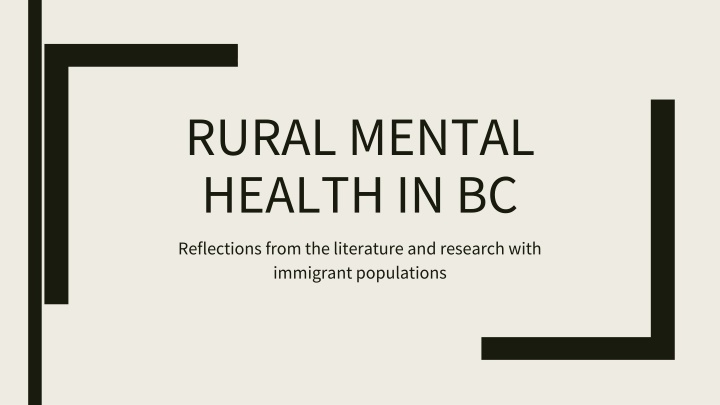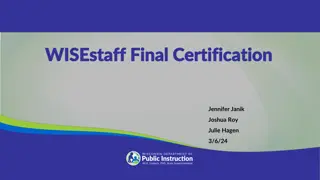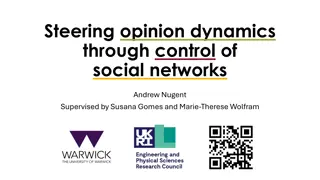
Insights into Rural Mental Health and Immigrant Populations in BC
Discover reflections and research findings on rural mental health in British Columbia, exploring challenges, strengths, and unique approaches for immigrant populations. Uncover the importance of community partnerships and localized strategies to enhance mental well-being in rural areas.
Download Presentation

Please find below an Image/Link to download the presentation.
The content on the website is provided AS IS for your information and personal use only. It may not be sold, licensed, or shared on other websites without obtaining consent from the author. If you encounter any issues during the download, it is possible that the publisher has removed the file from their server.
You are allowed to download the files provided on this website for personal or commercial use, subject to the condition that they are used lawfully. All files are the property of their respective owners.
The content on the website is provided AS IS for your information and personal use only. It may not be sold, licensed, or shared on other websites without obtaining consent from the author.
E N D
Presentation Transcript
RURAL MENTAL HEALTH IN BC Reflections from the literature and research with immigrant populations
An issue of nature or numbers? Fear of stigma, lack of anonymity Ethic of self-reliance or hardiness Increased likelihood of isolation Out-migration of youth Low immigrant density Economies of scale Stretching dollars by making one size fit all
Focus on capacities or crises? Flexibility and collaborative approach to care Tight-knit networks of support Strong relationship with the natural environment Poorer mental health outcomes, greater incidences of suicide Perceived lower quality of rural services by locals
REFLECTION #1: When we talk about rural mental health we walk on a tightrope, acknowledging both community challenges and strengths
REFLECTIONS #2 & #3: Rural mental health approaches are Birthed from the ground up Require creative partnerships
The project(s) 1. Understanding Belonging 2. Building Belonging 3. Mobilizing What Works
The projects 1. Project 1: Understanding Belonging 1. What are the pathways for belonging among an immigrant diaspora in a region of the South Okanagan? 2. How do these experiences contribute or shape mental wellbeing? 2. Building Belonging 3. Mobilizing What Works
Project 1 take home messages Think beyond the 9 to 5 Flexibility opens the door to trust Give space for community leadership Services should have the face of those you aim to serve Acceptability beyond access Programs offered must reflect community priorities
The project(s) 1. Understanding Belonging 2. Building Belonging 1. What are the priorities for building belonging in the community? 2. What are the local strengths that we can leverage towards improved mental wellbeing? 3. Mobilizing What Works
Wider community Community priorities Service Providers Study Community strengths Participants Local values
Project 2 take home messages Move beyond consultation towards ownership (from conception to evaluation) Make the space for dialogue and consensus-building It needs to be housed in a physical space
REFLECTION #4 Culturally-relevant services is lived through partnership and collective decision-making
The project(s) 1. Understanding Belonging 2. Building Belonging 3. Mobilizing What Works
NEXT STEPS Translate findings to front-line organizations Link informal and formal networks for sustained mental health promotion
Please stay in touch! Susana.caxaj@ubc.ca





















